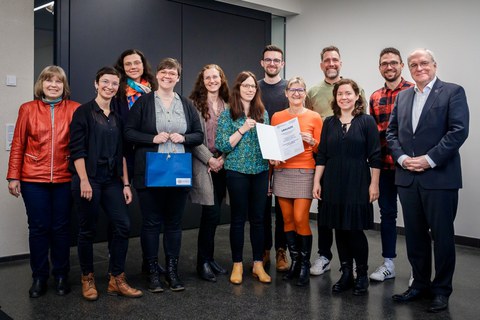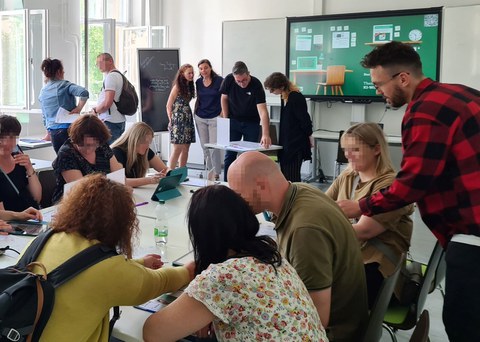15.01.2025
GFF-Lehrpreis 2024 für Angebote in der Lehrkräftebildung geht an das Pädagogische KI-Labor

Verleihung des GFF-Lehrpreis 2024
Bei der Preisverleihung: v.l.n.r: Fr. Dr. Krätzig (GFF), Christin Nenner (BQL.Digital), Aurica Borszik, Claudia Hottas, Dr. Melanie Wohlfahrt, Dr. Anja Mede-Schelenz (alle BQL GS), Julian Kriegel (Professur für Grundschulpädagogik/Mathematik), Dr. Peggy Germer (Projektkoordination BQL), Prof. Sebastian Schorcht (Inhaber der Professur für Grundschulpädagogik/Mathematik), Dagmar Oertel (BQL.Digital), Alexander Klippstein (BQLGS), Prof. Kober (GFF)
Am 15.01.2025 fand die feierliche Preisverleihung für ein besonderes Angebot in der Lehrkräftebildung statt. So erhielt „Das pädagogische KI-Labor – ein Lernraum zur Entwicklung von KI-Kompetenz für Grundschullehrkräfte“ den Lehrpreis 2024 der GFF der TU Dresden e.V. für ein Angebot in der Lehrkräftebildung. Die Grundschulpädagogik/ Mathematik stellte dabei auch ein Angebot zur Verfügung. Mit der Förderung sollen das kreative und nachhaltige Konzept sowie ein besonderes Engagement im Rahmen der Berufsbegleitenden Qualifizierung von Lehrkräften und in der grundständigen Lehramtsausbildung gewürdigt werden, so Prof. Kober von der GFF.
Durch die Gesellschaft von Freunden und Förderern der TU Dresden e.V. (GFF) wurden 2024 erstmals drei Lehrpreiskategorien ausgeschrieben. Neben dem Lehrpreis für außeruniversitäre Lernorte und studentische Lehr- und Lernangebote gab es 2024 eine neue Kategorie: den Lehrpreis für Angebote in der Lehrkräftebildung.
Der Vorstand der GFF entschied sich, gemeinsam mit dem Prorektor Bildung, zwei hervorragende Angebote mit dem Lehrpreis für Angebote in der Lehrkräftebildung auszuzeichnen. Gewürdigt wurden innovative Lehr- und Lernformate.

Impressionen aus dem pädagogischen KI-Labor am 06.06.2024
Zum einen wurde das Konzept des pädagogischen KI-Labors für Seiteneinsteiger:innen (semesterübergreifend) im Programm der Berufsbegleitenden Qualifizierung von Lehrkräften (BQL) des ZLSB der TU Dresden für das Lehramt Grund- und Förderschule sowie für Studierende des Grundschullehramts der TU Dresden gefördert. Die Preisträger:innen (siehe Bildunterschrift oben) entwickelten ein Konzept, um „future skills“ für die Primarstufe in drei Bereichen zu fördern. Dazu gehören grundsätzliches und vertiefendes Wissen über Künstliche Intelligenz, KI-Anwendungen in der Praxis sowie ethische und moralische Aspekte beim Einsatz von KI.
Das pädagogische KI-Labor unterstützt selbstgesteuertes Lernen und ist auf unterschiedliche Erfahrungsstufen abgestimmt. Im ersten Bereich erkunden angehende Lehrkräfte eine Lernlandkarte zu KI und reflektieren in einem digitalen Schreibgespräch notwendige Regelungen für den KI-Einsatz in der Bildung. Ein KI-Memory ermöglicht einen spielerischen Zugang, indem KI-Begriffe mit Beschreibungen verknüpft werden. Im zweiten Bereich testen die Teilenehmenden KI-Tools und Prompt-Techniken, darunter Programme, wie KI-gestützte Sprachtools für die interkulturelle Elternarbeit und KI-Agenten für die Modifikation von Mathematikaufgaben. Im dritten Bereich diskutieren Lehrkräfte an einer interaktiven Pinnwand die Vor- und Nachteile von KI-Technologien.
Mit dem zweiten Lehrpreis für Angebote in der Lehrkräftebildung wurde eine Lehrveranstaltung zu "Anwendungen der Physik und ihre Didaktik" für Studierende des 8. Semesters gewürdigt. Die Preisträger:innen sind hier Fr. Prof.in Gesche Pospiech und Dr. Sebastian Schellhammer.
Bei beiden ausgezeichneten Angeboten der Lehrkräftebildung standen die Kompetenzvermittlung und ein wirksamer Praxistransfer für die Schule im Zentrum.
